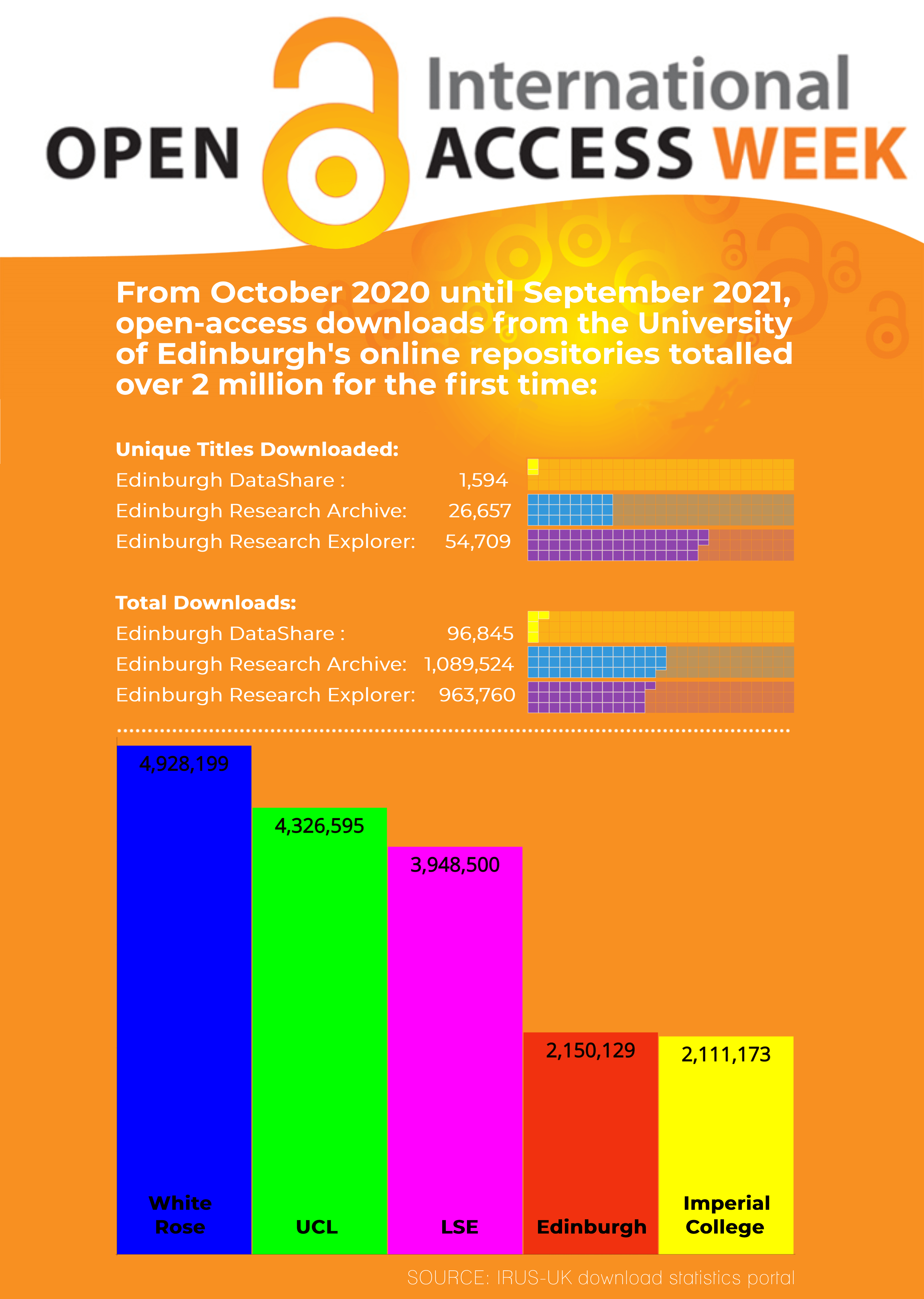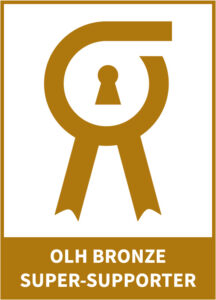Monthly Archives: October 2021
Introducing Edinburgh Diamond: Library-supported Open Access Books and Journals
Library and University Collections currently offer a journal hosting service, free of charge to staff and students, which you may already be familiar with.
Open Access Week is the perfect time to share that that we have rebranded as Edinburgh Diamond and added a book hosting service to our offering!
The book hosting service will offer much of what the journal hosting service offers: ISBN and DOI allocation, a hosting platform for textbooks, monographs and edited collections, metadata deposits, indexing arrangements, annual reporting, ongoing technical support, guidance on publishing best practice… and more!
Bringing our journal and book services under one umbrella allows us to promote our services as a whole. Edinburgh Diamond does what it says on the tin: promotes diamond open access, transparency, and high-quality research. If you know someone who may benefit from using our service, please put them in touch with Rebecca Wojturska: rebecca.wojturska@ed.ac.uk.
Find out more about Edinburgh Diamond: https://www.ed.ac.uk/information-services/research-support/edinburgh-diamond
Take a look at our new book hosting site:
https://books.ed.ac.uk/
Transformative Agreements: a new way to ‘Read & Publish’

Open access to research publications is one of the key principles of the open science movement. It is often one of the last steps taken, but thankfully, it is also one of the easier steps for researchers to participate in due to investment in infrastructure and support from universities, publishers and research funders. When you publish your research there are three publishing routes you can follow:
Route 1: Publish in a traditional subscription journal and take responsibility for making the Author Accepted Manuscript (AAM) OA in an institutional or subject repository. (Also known as Green OA).
Route 2: Publish in a fully OA journal or platform. (Also known as Gold OA).
Route 3: Publish in a traditional subscription journal through a transformative agreement that is available to you via your organisation. (Also known as ‘Read & Publish’ deals).
The University of Edinburgh’s open access preference is Route 1 using our institutional repository (Pure) to ensure that you are compliant with the REF open access policy. If you have access to funding then you can take Route 2 as the costs should be covered by research funders. Route 3 is a relatively new option that Libraries are exploring to lower barriers to participate in open access publishing, and hopefully restrain and lower the total cost of publishing.
Moving towards a ‘Read & Publish’ model
The idea behind a transformative agreement is that it converts subscription expenditure into a publishing fund that makes all research output OA on publication, whilst maintaining access to any paywalled content. If enough libraries sign up this will shift the publishing business model away from selling subscriptions and paywalls to providing high quality open research.
Recently we have seen an explosion of ‘Read & Publish’ deals being offered by publishers, partly due to the Plan S initiative and also due to the activity of Jisc Collections – the UK organisation who has been taking a leading role in negotiating a transition to open access on behalf of UK libraries. In 2020 the University of Edinburgh had signed up to 3 transformative agreements, but in the space of one year this figure has leaped to 21, with an additional 2 pilot agreements being tested.
How to take advantage of a ‘Read & Publish’ deal
Each of the open access agreements are slightly different due to publishers demands, but generally speaking the process is simple:
- The corresponding author has to be affiliated with the University of Edinburgh, either as a staff member or student. Normally only original research or review articles are covered by the agreement.
- Check if the journal you are publishing in is part of a ‘Read & Publish’ deal. A handy searchable list is available here: https://www.ed.ac.uk/information-services/research-support/publish-research/open-access/read-and-publish-journals
- Upon submission, identify yourself as an eligible author, and then the request should automatically be passed to the Library for approval.
- Select an open licence – we recommend Creative Commons Attribution (CC BY) as this will ensure you are compliant with any relevant research funders open access policies.
You can contact the Scholarly Communications Team (openaccess@ed.ac.uk) for more information about publisher ‘Read & Publish’ deals available at Edinburgh, or you can visit these dedicated webpages: https://www.ed.ac.uk/information-services/research-support/publish-research/open-access/request-apc-payment/publisher-discounts
Unveiling the new Open Access policy at UoE
For Open Access Week 2021 we are pleased to announce a brand new Research Publications & Copyright Policy that will make it even easier for researchers from the University of Edinburgh to make their publications open access.
Earlier this month the University Executive approved the Research Publications & Copyright Policy (2021) which details our approach to the new open access requirements of major research funders from 1 January 2022.
The Research Publications & Copyright Policy (2021) can be read in full on the Information Services web pages, but the key details are outlined below:
- The University of Edinburgh confirms staff members retain the copyright to scholarly works they produce (which is the opposite of UK employment law which states that employers own the copyright to works produced in work time).
- To help comply with funders and other open access requirements, members of staff grant the right for the University of Edinburgh to make manuscripts of their scholarly articles publicly available under the terms of a Creative Commons Attribution (CC BY) licence upon publication.
- This policy will begin on 1st January 2022, and will apply to journal articles and conference proceedings.
This new policy is in line with major organisations including UKRI and the Wellcome Trust and will allow all researchers to make their work open access immediately regardless of their funding situation. Support for implementation of the new policy is available through library research support staff. Any questions or comments regarding the policy can be directed to the Scholarly Communications Team at openaccess@ed.ac.uk.
Open Access Week 2021
 Next week is the annual international Open Access Week where organisations celebrate and showcase open access developments and projects. It is a time for the wider community to coordinate in taking action to make openness the default for research.
Next week is the annual international Open Access Week where organisations celebrate and showcase open access developments and projects. It is a time for the wider community to coordinate in taking action to make openness the default for research.
This year’s theme of “It Matters How We Open Knowledge: Building Structural Equity” aligns with the recently released UNESCO Recommendation on Open Science, of which Open Access is a crucial component.
We will be publishing a series of blog posts to showcase the best of Open Access at the University of Edinburgh. To give you a sneak peak here is the publishing schedule:
- Monday: Unveiling the new UOE Research Publications & Copyright policy
- Tuesday: Transformative Agreements: a new way to ‘Read & Publish’
- Wednesday: Edinburgh Diamond: a new OA platform for UOE
- Thursday: Repository Downloads: a year of Open Access
- Friday: Meet the Team: the experts providing help and support at UOE
Open Library of Humanities Bronze Supporter
The University of Edinburgh has opted to support the Open Library of Humanities for another year- this time as a Bronze level supporter. This additional support will enable the OLH to continue its growth mission to convert subscription journals to a solid, ongoing, open-access model, with no author-facing charges.
Theo Andrew, Scholarly Communications Manager at the University of Edinburgh, said: “The OLH is such good value for money. Library budgets are always tight, but we feel that we should be doing more to support academic-led publishing. OLH puts a lot back into the academic community and we are pleased to help with its ongoing sustainability.”




